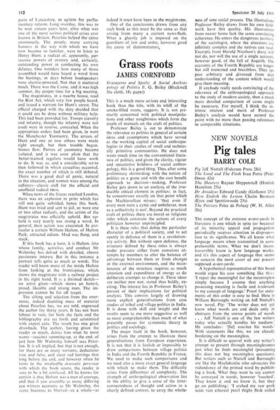Grass roots
JAMES CORNFORD
Stratagems and Spoils: A Social Anthro- pology of Politics F. G. Bailey (Blackwell 36s cloth, 18s paper)
This is a much more serious and interesting book than the title, with its whiff of the smoke-filled room, suggests. It is not pri- marily concerned with political manipula- tions and other naughtiness which form the staple of manuals on the craft of politics.
Professor Bailey is out to demonstrate the relevance to politics in general of certain ideas and assumptions which have served as the working capital of social anthropo- logists in their studies of small and technic- ally primitive communities. He does not waste much time on the conventional litera- ture of politics, and given the clarity, vigour and speculative boldness of social anthro- pology, this is a good thing. Thus after some preliminary skirmishing with the notion of politics as a game and with the cost benefit approach to decision - making, Professor Bailey gets down to an analysis of the irre- ducible ethical element in politics: in fact, he concentrates exactly on that point which the Machiavellian misses: 'that even if every man were a cynic and unbeliever, man as a collectivity is not'. Beyond the practical craft of politics there are moral or religious rules which constrain the actions of every politician however unprincipled.
It is these rules that define the particular character of a political society, and to act openly in defiance of them is a revolution- ary activity. But without open defiance, the structure defined by these rules is always under pressure either from conscious at- tempts by members to alter the balance of advantage between them or from changes in the external environment, and the main- tenance of the structure requires as much attention and expenditure of energy as do deliberate attempts to change it. These ideas are neither new nor, stated thus baldly, ex- citing. The interest lies in Professor Bailey's pursuit of their implications for political analysis. This consists largely of drawing more explicit generalisations from case studies of tribal and village politics in India. It is done with skill and insight and the results seem to me more suggestive as well as more comprehensible than much of what presently passes for systematic theory in politics and sociology.
The major fault in the book, however, arises from the attempt to illustrate these generalisations from European experience, It is not that it is foolish or impossible to draw comparisons between village politics in India and the Fourth Republic in France. We need to make such comparisons and we need also a more exact general language with which to make them. The difficulty arises from differences of complexity. The strength of anthropological observation lies in the ability to give a sense of the inter- connectedness of thought and action in a clearly defined context, to carry the whole- ness of sane social process. The illustrations Prgfessor Bailey draws from his own field- woik have this quality. His illustrations from nearer home lack the same convincing coherence. He enters the dangerous territory of the sociologist, where the situations are infinitely complex and the natives can read. Excerpts from Harold Nicolson's diary will not do, nor will the use of a single account, however good, of the fall of Asquith. The accounts of the Fourth Republic are longer but still truncated and breathless. They ap- pear arbitrary and divorced from that understanding of the context which would give them meaning.
If anybody really needs convincing of the relevance of the anthropological approach to the study of modern society, then a much more detailed comparison of cases might be necessary. For myself, I think the in- trinsic interest and merit of Professor Bailey's analysis would have earned the point with no more than passing references to comparable situations.


































 Previous page
Previous page